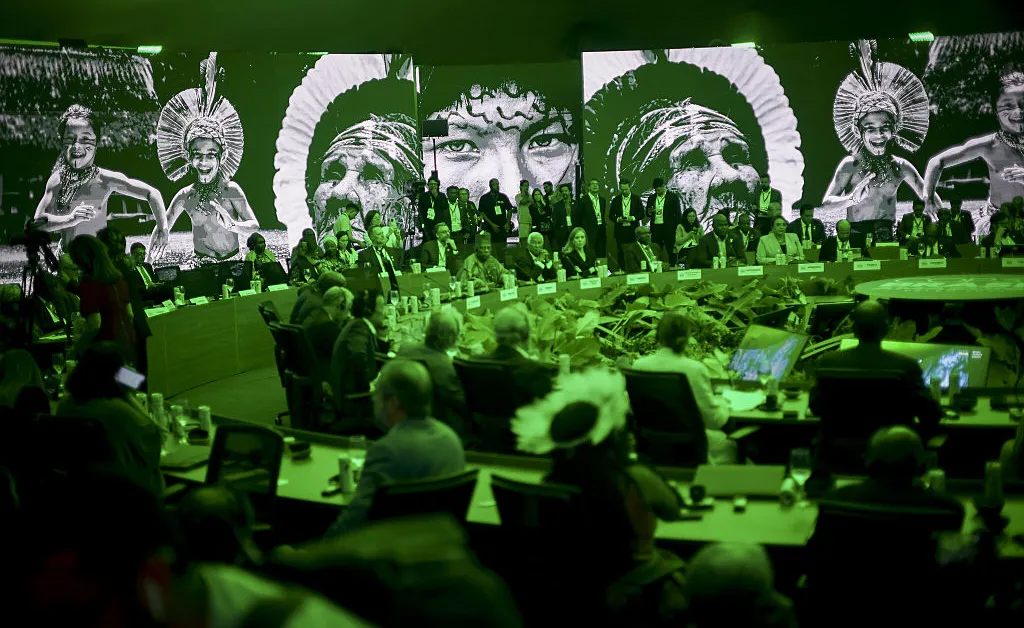This year’s U.N. climate summit, COP30, opened with a moment that should have set the tone for a new era. Brazil’s President Luiz Inácio Lula da Silva declared it the “COP of Truth,” rooted in the Brazilian idea of Mutirão, a collective effort driven by solidarity. He urged leaders to deliver the concrete roadmaps the world urgently needs: a plan to overcome dependence on fossil fuels, a strategy to reverse deforestation, and a financing package that is fair and planned rather than stitched together in moments of crisis. He asked countries to choose multilateralism over isolationism, science over ideology, and action over fatalism.
[time-brightcove not-tgx=”true”]
The world fell far short of that challenge. In a year of record heat, a landmark proposal backed by more than 80 countries for a global fossil-fuel transition roadmap was stripped from the final decision laying out the next steps for global climate action. The summit, held in the Amazon city of Belém, ended without a deforestation roadmap. And climate finance commitments remain far below what is required.
To keep even a coin-flip chance of limiting warming to 1.5°C the world must cut emissions roughly 55% by 2035 compared to 2019 levels. Current national plans submitted within the COP process offer barely a fraction of that, putting the world on track for roughly 2.5°C of warming, an outcome no stable society or economy can tolerate.
It is perhaps shocking, but not surprising. Over 1,600 fossil fuel lobbyists were accredited, roughly one in every 25 participants. If they were a country, these lobbyists would be the second largest delegation after host country Brazil. A process that requires consensus among nearly 200 countries gives de facto blocking power to the least ambitious. And while the absence of the United States removed one source of obstruction, it also removed political weight. A more assertive bloc of petrostates filled that vacuum.
Read more: The U.S. Is Ceding Climate Leadership to Authoritarian States
And yet Belém revealed another truth. If we judge COP30 only by the final communiqué, we miss the real story. The centre of gravity is shifting. Much of the most important progress is happening around the formal process and despite its limitations.
Under the Action Agenda, a non-negotiated process that mobilizes voluntary action, major actors—from businesses and investors to cities and civil society—set out investment plans totaling $1 trillion for clean energy and electricity grid expansion by 2030. Governments and donors backed over $9 billion for regenerative landscapes across more than 110 countries. The Tropical Forests Forever Facility, a new endowment-style fund, secured billions in initial public funding to protect forests, with at least 20% directed to Indigenous and local communities. More than $300 million was committed by a new climate and health funders coalition to strengthen climate-resilient health systems.
Perhaps the most under-appreciated breakthrough was the joint statement from the three Rio Conventions. Climate, biodiversity, and land degradation, long managed in separate silos, were finally treated as one system. This was not simply bureaucratic housekeeping. It marks the beginning of a planetary health approach.
Read more: The Future of Climate Progress Is Being Built in the Global South
There were also welcome signs of geopolitical realignment. Colombia and the Netherlands announced an international conference in 2026 to develop an equitable, science-based roadmap for phasing out fossil fuels. It is a direct attempt to pick up the agenda blocked in Belém and move it forward through a coalition of the willing. Separate roadmaps for deforestation, food systems, and adaptation are emerging through similar partnerships.
Meanwhile, the economics are continuing to shift decisively in favor of decarbonization. Clean energy continues to scale. Technology costs keep falling. Investors are reallocating capital. Companies that moved early are already enjoying valuation premiums compared with laggards as markets increasingly price in regulatory risk, climate risk, and the opportunity created by low-carbon growth.
But the world is still far from where it needs to be. And none of this momentum can fully substitute for the regulatory frameworks and consistent national policies that only governments can provide. Business, finance, and civil society can lead, but they cannot legislate.
The deeper issue revealed in Belém is structural. Multilateralism still matters profoundly, but it may no longer be the primary engine of climate progress. The system as designed is struggling to deliver the scale and speed required. It restrains those ready to move and empowers those invested in standing still. This strain is heightened by the fact that three of the last four climate summits were hosted by autocratic regimes aligned with fossil interests. The venue itself has increasingly shaped and slowed what was possible.
Given this reality, two urgent actions are now required.
First, business must step up decisively. Businesses plan far beyond political cycles, and the mounting risks of climate change are now material on every investment horizon. The transition needs companies that implement credible plans, shift capital from extraction to regeneration, transform supply chains, work with nature rather than against it, and advocate for policies that create stable and competitive markets. The most successful businesses of the next decade will be those that treat climate and nature as core strategic drivers rather than compliance issues.
Second, the COP process must evolve or risk losing all credibility. We need governance reforms that preserve consensus for the highest political questions, while preventing the most obstructive actors from paralysing technical negotiations. We need transparent guardrails on lobbying. We need to integrate the Rio Conventions into a single planetary health framework with one shared science base and coherent reporting. And where consensus proves impossible, we must push for negotiations to migrate to parallel forums, while keeping COP as the anchor.
History shows that change often comes when systems appear least capable of delivering it. COP30 may be remembered less for what it resolved and more for what it exposed: that ambition is outpacing architecture, and that the world is ready to move faster than the institutions designed to guide it.
The task now is to reform those institutions before they become a larger barrier to progress, while continuing to push for progress independently of them. The world is moving. The transition is underway. The real question is whether our institutions can still lead, or whether they will be left behind.
Institutional repair is a long project, but action cannot wait. Governments, businesses, and communities that act now will write the rules of the next economy. The future will be shaped by those who move, not those who wait for permission.
The post The World Is Moving Forward on Climate Action Whether Countries Like It or Not appeared first on TIME.




